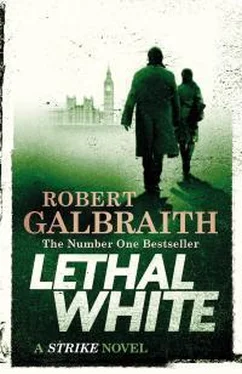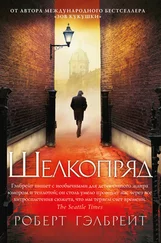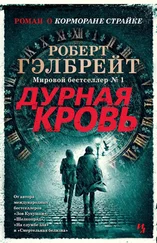When he finally joined the M6, Strike hoped to settle in at sixty miles an hour, but some arsehole in a Vauxhall Corsa decided to tailgate him.
‘Fucking overtake,’ growled Strike. He was not minded to alter his own speed, having settled in comfortably without needing to use his false foot more than was necessary, and for a while he glowered into his rear view mirror until the Vauxhall driver got the hint and took himself off.
Relaxing to the degree that was ever possible behind the wheel these days, Strike wound down the window to admit the fine, fresh summer’s day and allowed his thoughts to return to Billy and the missing Suki Lewis.
She wouldn’t let me dig , he had said in the office, compulsively tapping his nose and his chest, but she’ d let you.
Who, Strike wondered, was ‘she’? Perhaps the new owner of Steda Cottage? They might well object to Billy asking to dig up flowerbeds in search of bodies.
After feeling around with his left hand inside his provisions bag, extracting and ripping open a bag of crisps with his teeth, Strike reminded himself for the umpteenth time that Billy’s whole story might be a chimera. Suki Lewis could be anywhere. Not every lost child was dead. Perhaps Suki, too, had been stolen away by an errant parent. Twenty years previously, in the infancy of the internet, imperfect communication between regional police forces could be exploited by those wishing to reinvent themselves or others. And even if Suki was no longer alive, there was nothing to suggest that she had been strangled, let alone that Billy Knight had witnessed it. Most people would surely conclude that this was a case of much smoke, but no fire.
Chewing crisps by the handful, Strike reflected that whenever it came to a question of what ‘most people’ would think, he usually envisaged his half-sister Lucy, the only one of his seven half-siblings with whom he had shared his chaotic and peripatetic childhood. To him, Lucy represented the acme of all that was conventional and unimaginative, even though they had both grown up on intimate terms with the macabre, the dangerous and the frightening.
Before Lucy had gone to live permanently with their aunt and uncle in Cornwall, at the age of fourteen, their mother had hauled her and Strike from squat to commune to rented flat to friend’s floor, rarely remaining in the same place more than six months, exposing her children to a parade of eccentric, damaged and addicted human beings along the way. Right hand on the wheel, left hand now groping around for biscuits, Strike recalled some of the nightmarish spectacles that he and Lucy had witnessed as children: the psychotic youth fighting an invisible devil in a basement flat in Shoreditch, the teenager literally being whipped at a quasi-mystical commune in Norfolk (still, for Strike’s money, the worst place that Leda had ever taken them) and Shayla, one of the most fragile of Leda’s friends and a part-time prostitute, sobbing about the brain damage inflicted on her toddler son by a violent boyfriend.
That unpredictable and sometimes terrifying childhood had left Lucy with a craving for stability and conformity. Married to a quantity surveyor whom Strike disliked, with three sons he barely knew, she would probably dismiss Billy’s story of the strangled boy-girl as the product of a broken mind, sweeping it swiftly away into the corner with all the other things she could not bear to think about. Lucy needed to pretend that violence and strangeness had vanished into a past as dead as their mother; that with Leda gone, life was unshakeably secure.
Strike understood. Profoundly different though they were, often though she exasperated him, he loved Lucy. Nevertheless, he could not help comparing her with Robin as he bowled towards Manchester. Robin had grown up in what seemed to Strike the very epitome of middle-class stability, but she was courageous in a way that Lucy was not. Both women had been touched by violence and sadism. Lucy had reacted by burying herself where she hoped it would never reach her again; Robin, by facing it almost daily, investigating and resolving other crimes and traumas, driven to do so by the same impulse to actively disentangle complications and disinter truths that Strike recognised in himself.
As the sun climbed higher, still dappling the grubby windscreen, he experienced a powerful regret that she wasn’t here with him now. She was the best person he had ever met to run a theory past. She’d unscrew the thermos for him and pour him tea. We’d hav e a laugh.
They had slipped back into their old bantering ways a couple of times lately, since Billy had entered the office with a story troubling enough to break down the reserve that had, over a year, hardened into a permanent impediment to their friendship . . . or whatever it was , thought Strike, and for a moment or two he felt her again in his arms on the stairs, breathed in the scent of white roses and of the perfume that hung around the office when Robin was at her desk . . .
With a kind of mental grimace, he reached for another cigarette, lit up and forced his mind towards Manchester, and the line of questioning he intended to take with Dawn Clancy, who, for five years, had been Mrs Jimmy Knight.
15
Yes, she is a queer one, she is. She has always been very much on the high horse . . .
Henrik Ibsen, Rosmersholm
While Strike was speeding northwards, Robin was summoned without explanation to a personal meeting with the Minister for Culture himself.
Walking in the sunshine towards the Department for Culture, Media and Sport, which stood in a large white Edwardian building a few minutes away from the Palace of Westminster, Robin found herself almost wishing that she were one of the tourists cluttering the pavement, because Chiswell had sounded bad tempered on the phone.
Robin would have given a great deal to have something useful to tell the minister about his blackmailer, but as she had only been on the job a day and a half, all she could say with any certainty was that her first impressions of Geraint Winn had now been confirmed: he was lazy, lecherous, self-important and indiscreet. The door of his office stood open more often than not, and his sing-song voice rang down the corridor as he talked with injudicious levity about his constituents’ petty concerns, name-dropped celebrities and senior politicians and generally sought to give the impression of a man for whom running a mere constituency office was an unimportant sideshow.
He hailed Robin jovially from his desk whenever she passed his open door, showing a pronounced eagerness for further contact. However, whether by chance or design, Aamir Mallik kept thwarting Robin’s attempts to turn these greetings into conversations, either interrupting with questions for Winn or, as he had done just an hour previously, simply closing the door in Robin’s face.
The exterior of the great block that housed the DCMS, with its stone swags, its columns and its neoclassical façade, was not reassuring. The interior had been modernised and hung with contemporary art, including an abstract glass sculpture that hung from the cupola over the central staircase, up which Robin was led by an efficient-seeming young woman. Believing her to be the minister’s goddaughter, her companion was at pains to show her points of interest.
‘The Churchill Room,’ she said, pointing left as they turned right. ‘That’s the balcony he gave his speech from, on VE Day. The minister’s just along here . . . ’
She led Robin down a wide, curving corridor that doubled as an open-plan workspace. Smart young people sat at an array of desks in front of lengthy windows to the right, which looked out onto a quadrangle, which, in size and scale, bore the appearance of a colosseum, with its high white windowed walls. It was all very different from the cramped office where Izzy made their instant coffee from a kettle. Indeed, a large, expensive machine complete with pods sat on one desk for that purpose.
Читать дальше












